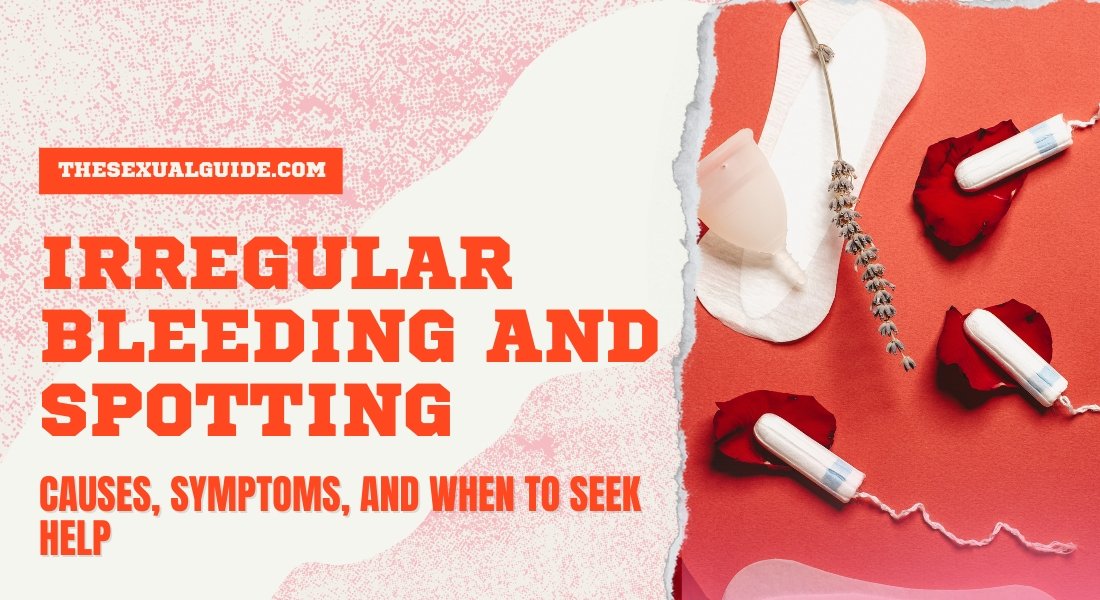Irregular bleeding and spotting can be unsettling.
While it’s not always a cause for alarm, understanding the potential reasons behind it can help you take the right steps toward better health.
Let’s dive into what might be causing this and when you should seek medical advice.
What Is Irregular Bleeding and Spotting?
Irregular bleeding refers to any vaginal bleeding that occurs outside your regular menstrual cycle.
Spotting, on the other hand, is light bleeding that can happen at any time during your cycle.
Both can be caused by a variety of factors, ranging from hormonal changes to more serious health conditions.
Common Causes of Irregular Bleeding and Spotting
Hormonal Imbalances
- Birth Control: Starting, stopping, or changing birth control methods can lead to breakthrough bleeding.
- Polycystic Ovary Syndrome (PCOS): This condition can cause irregular periods and spotting.
- Thyroid Issues: Both hyperthyroidism and hypothyroidism can disrupt your menstrual cycle.
Uterine and Cervical Conditions
- Fibroids: Non-cancerous growths in the uterus can cause heavy or irregular bleeding.
- Adenomyosis: This condition involves the lining of the uterus growing into the muscle wall, leading to heavy bleeding and pain.
- Cervicitis: Inflammation of the cervix can cause spotting and discomfort.
Infections and Injuries
- Sexually Transmitted Infections (STIs): Infections like chlamydia or gonorrhea can cause bleeding.
- Genital Injuries: Any trauma to the genital area can result in spotting.
Pregnancy-Related Issues
- Implantation Bleeding: Light spotting can occur when a fertilized egg attaches to the uterine lining.
- Miscarriage: Heavy bleeding and cramping can be signs of a miscarriage.
- Ectopic Pregnancy: This is a medical emergency where the embryo implants outside the uterus, causing bleeding and severe pain.
Cancer and Precancerous Conditions
- Endometrial Hyperplasia: Thickening of the uterine lining can lead to abnormal bleeding.
- Gynecologic Cancers: Cancers of the uterus, cervix, or ovaries can cause irregular bleeding.
When to See a Doctor
While occasional spotting might not be a cause for concern, certain symptoms warrant a visit to your healthcare provider:
- Heavy Bleeding: Soaking through a pad or tampon every hour.
- Prolonged Bleeding: Bleeding that lasts more than seven days.
- Pain: Severe cramping or abdominal pain.
- Other Symptoms: Fever, dizziness, or unusual discharge.
Diagnosis and Treatment
Your doctor may perform several tests to determine the cause of your irregular bleeding:
- Pelvic Exam: To check for any abnormalities in the reproductive organs.
- Ultrasound: To get a detailed image of the uterus and ovaries.
- Blood Tests: To check for hormonal imbalances or infections.
- Biopsy: A small sample of tissue may be taken for further analysis.
Treatment will depend on the underlying cause:
- Hormonal Therapy: Birth control pills or hormone replacement therapy can regulate your cycle.
- Medications: Antibiotics for infections or medications to shrink fibroids.
- Surgery: In cases of severe fibroids, cancer, or other structural issues, surgery may be necessary.
Tips for Managing Irregular Bleeding
- Track Your Cycle: Keep a diary of your menstrual cycle and any episodes of bleeding or spotting.
- Healthy Lifestyle: Maintain a balanced diet, exercise regularly, and manage stress.
- Regular Check-ups: Routine visits to your gynecologist can help catch any issues early.
Conclusion
Irregular bleeding and spotting can stem from a variety of causes, some benign and others more serious.
Understanding the potential reasons and knowing when to seek medical advice can help you take control of your health.
Always consult with a healthcare provider if you have concerns about your menstrual cycle.
FAQs: Irregular Bleeding and Spotting: Causes, Symptoms, and When to Seek Help
1. What is considered irregular bleeding or spotting?
Irregular bleeding refers to bleeding outside of a normal menstrual cycle; this can include spotting between periods, prolonged bleeding, bleeding after sex, or bleeding after menopause. It may vary in amount, duration, and timing.
2. What are common causes of irregular bleeding or spotting?
Common causes include hormonal imbalances, contraceptive use (especially IUDs or birth control pills), stress, polycystic ovary syndrome (PCOS), thyroid disorders, uterine fibroids, endometriosis, infections, or even early pregnancy.
3. When should I be concerned about irregular bleeding or spotting?
You should seek medical attention if the bleeding is heavy or persistent, occurs after menopause, happens frequently between cycles, is accompanied by pain, or if you're pregnant and experiencing bleeding.
4. Can birth control cause spotting or irregular bleeding?
Yes, especially in the first few months of starting or switching birth control methods. Spotting is common with hormonal contraceptives and typically resolves within a few cycles, but if it continues, consult your healthcare provider.
References
- Mount Sinai. Vaginal bleeding between periods.
- MedlinePlus. Uterine fibroids.
- American Academy of Family Physicians. Endometrial hyperplasia.
- Yale Medicine. Gynecologic cancers.
- Office on Women's Health. Polycystic ovary syndrome.
- The American College of Obstetricians and Gynecologists (ACOG). What you should know about breakthrough bleeding with birth control.
- Rafique N, Al-Sheikh MH. Prevalence of menstrual problems and their association with psychological stress in young female students studying health sciences. Saudi Med J. 2018;39(1):67-73. doi:10.15537/smj.2018.1.21438






